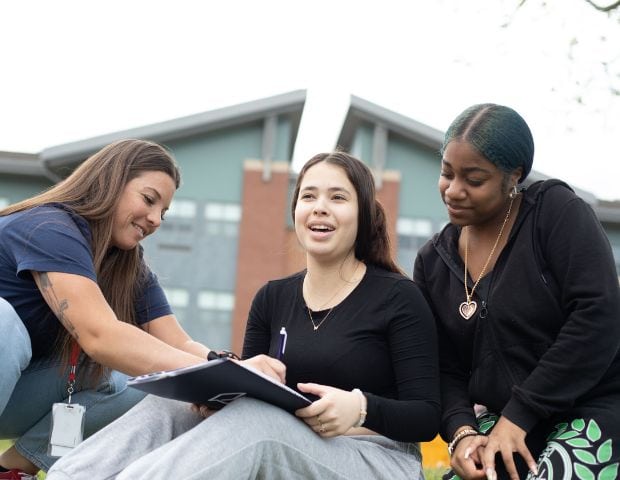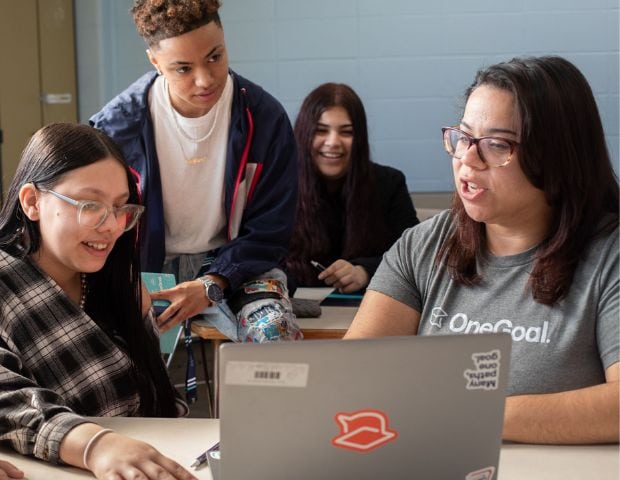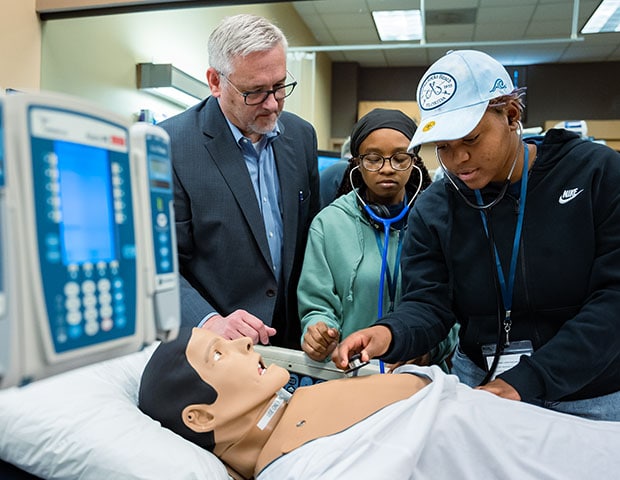Ensuring college and career readiness often requires schools to be creative with how they get students excited about postsecondary choices.
OneGoal CEO Melissa Connelly delivered a thought-provoking speech at the 2023 NCAN National Conference. The following is an edited transcript of her remarks about the recent narrative around whether college is still worth it for students across the United States.
“The growing disaffection that many American families feel toward higher education is entirely understandable—but it’s also a major problem for our country. The evidence from the labor market is clear: The United States is going to need millions more college graduates in the years and decades ahead. The problem is that the obstacles we’ve placed in the way of many students—especially those growing up in families without significant financial resources—can sometimes seem too daunting to overcome.”
Paul Tough
Journalist + Author
Last month, this quote appeared in the New York Times Magazine. The article titled Americans Are Losing Faith in the Value of College. Whose Fault Is That? was written by Paul Tough.
Paul Tough and OneGoal go way back. In 2012, Paul published How Children Succeed and dedicated an entire chapter to the work we were doing at OneGoal. In 2019, I interviewed him in Chicago on his The Years that Matter Most book tour. Many of our champions associate Paul with OneGoal and OneGoal with Paul.
So, a quote by Paul about the growing disaffection of higher education caused quite a stir. Within a few hours, I had 10-20 emails in my inbox referencing the article.
What fascinated me is that the content of these emails was squarely in two camps.

There was a group of people who called this article “dangerous for OneGoal and anyone working in the college access and success space.” It seemed to affirm for many people why OneGoal is less relevant today: why trades and alternative paths to the workforce were a better way to invest in youth. The other half of the emails? They said the exact opposite. “Paul Tough’s article in this morning’s NYT was incredible. I’ve read all his books… but today’s article cut right to the point and summarized damn near every core facet of our work. This is why the work we do matters now more than ever.”
I called Paul to ask him what he was seeing and hearing and if he had any thoughts about the implications for our work. Funnily enough, he reported the exact same phenomenon. How our sector can look at the same set of facts and walk away with two wildly different and seemingly opposing conclusions is the profound result of two phenomena undergirding our work: confirmation bias and what happens when we over-index on the intellectual conversations of adults instead of the realities of our kids.
Different Career
Pathways—and Opportunities
For most of my career, I would not have even accepted the invitation to speak on the topic of “Is college worth it?” It all felt so silly, like a distraction or justification for continuing to accept the broken system and continuing to track kids as long as they weren’t my kids.
Two things I’d point to: first, my lived experience. I am 1 of 6 kids, and we are quite the American microcosm. Two never graduated high school, two had a high school degree and some college/technical school, and two had master’s degrees.
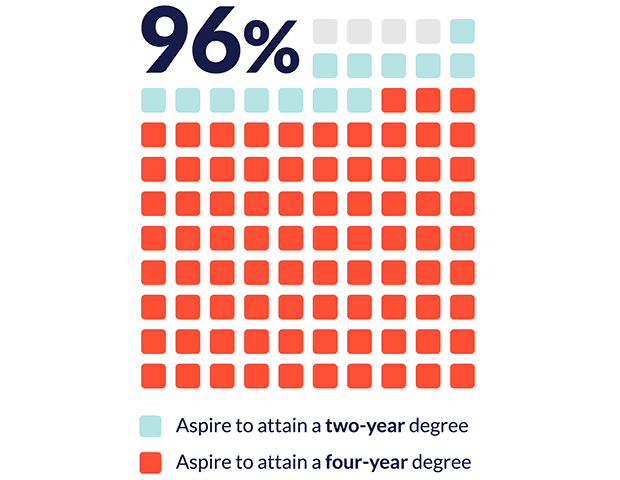
Source: Roderick, Melissa, et al. “Potholes on the road to college.” Sociology of Education, vol. 84, no. 3, 2011, pp. 178–211, https://doi.org/10.1177/0038040711411280.
I could bore you with the differences, but you would be wildly unsurprised. Job security, healthcare benefits, salary, safety at work…I could go on and on and on. So no, I was not the person to even entertain the “debate.” My lived experience supported that the quantitative data has been and continues to be conclusive. A degree has real value and is still the best path to an economically viable wage (56% of good jobs—with a salary above $55,000—require a bachelor’s degree). But let’s be honest, I am preaching to the choir to this audience, who I am sure knows the data.
Second, as long as our kids wanted it for themselves, I wanted it for them, too. Their aspirations mattered way more to me than the aspirations you think are or are not appropriate for them. The first article we all read as we onboarded at OneGoal in 2011 was called Potholes on the Road to College. It shared: “83 percent of Chicago Public Schools (CPS) seniors stated that they hoped to earn a bachelor’s degree or higher, and an additional 13 percent aspired to attain a two-year or vocational degree.” I was going to fight unapologetically for what 96% of our students wanted. The opinions of adults would not be where I spent my time.
Lagging College
and Career Readiness
And yet, when you do this work long enough it humbles you. I have begun to question my once firmly held beliefs, but maybe not in the way you think. The benefits to a degree are still clear, but who they benefit is increasingly inequitable and wildly unfair. Additionally, Students’ aspirations are more diverse than they were a decade ago. A recent survey by ECMC found that a majority (63%) of teens wish their high school provided more information about the variety of postsecondary opportunities available. More than half of teens say their post-high school education should last less than four years, and skills should be taught hands-on in small classes or through on-the-job opportunities.
Given this, what is the right answer? What I’d suggest is that we don’t take the bait, we don’t read the facts seeking only to affirm the existing perspective we carry, and we don’t have an overly academic and intellectual debate. Instead, let’s dig into why this is even a question for young people, especially for young people in the communities we serve.
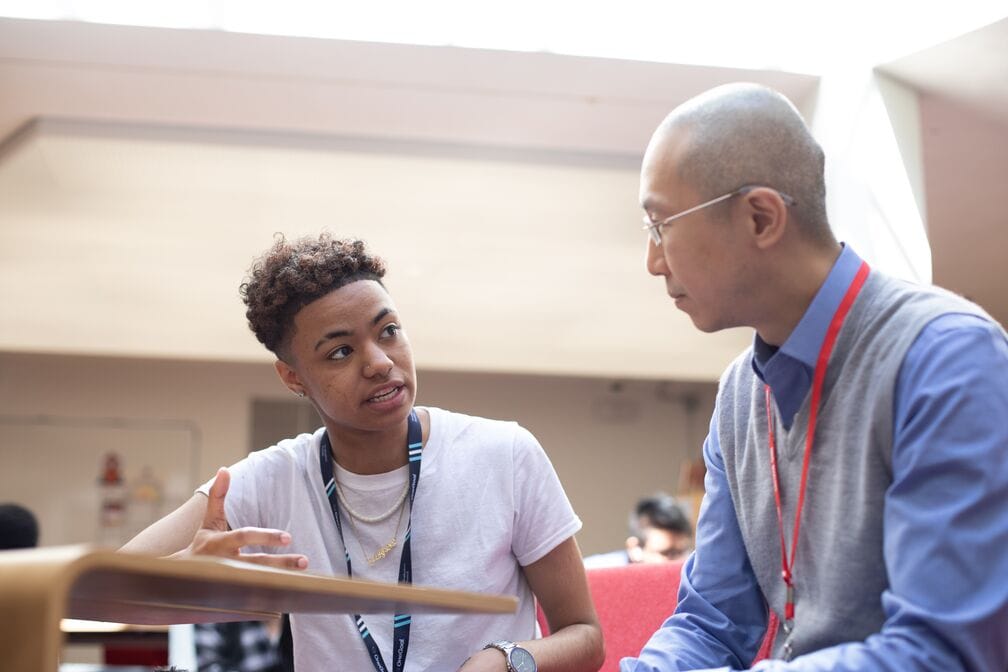
Many students wish their high school provided more information about postsecondary opportunities.
Closing the
Opportunity Gap

Today, it’s clear that the value of a degree is not a given as it once was, especially for students from low-income backgrounds and students of color. They now have to calculate a myriad of factors— they’re thinking about the huge financial investment required, the fact that they’ll forgo the immediate income a job provides, and which their families might rely on. They’re battling implicit and even explicit messages that they don’t belong—because of the color of their skin, immigration status, or bank account. They’re wondering about what happens if they start and then don’t finish—they’ll be behind and laden with debt! Or they’re asking themselves, “is college even the right thing for me, given what I want to do in life?” Too often, they are making these calculations with little support, and so they decide it’s not worth it.
Let’s spend less time arguing about whether or not it is worth it and instead ask ourselves questions like: How do we increase the value proposition for our young people? How can we affirm students and help them make the right calculations to choose their postsecondary path? How do we use the cynicism of higher education to innovate and create more pathways designed for and more flexible to the challenges of poverty?
OneGoal has moved past a bachelor-or-bust mentality. Instead, we support students to pursue high-quality postsecondary pathways that are best suited to their personal, academic, and financial needs. For the majority of our students, this still means a two- or four-year college. But for others, this looks like high-quality technical credentials or certifications. That’s what we mean by many paths, one goal. Studies continue to suggest students desire support in which they can receive nonjudgmental advice that encourages multiple paths best suited to their goals. And it’s not just the studies. We see this played out in the lived experiences of the Fellows we serve.
“We need organizations like OneGoal to help young people find their way past those obstacles. In the long term, our national higher education system clearly needs serious reform. But while we’re figuring out how to accomplish those reforms, we need to do a lot more right now to help students succeed in the system as it exists today. OneGoal is one of the best models I’ve seen for providing that help.”
Paul Tough
We are choosing not to be overly dogmatic at this moment, to not stick our heads in the sand around some concerning trends in the data. Instead, we privilege the voices of our students and help them find high-quality, affordable pathways that align with their identity, values, and aspirations. We will continue to expand our definition of success to include all paths that lead to a family sustaining wage. And we must provide the much needed feedback and support to traditional higher education institutions to address the ways that they are still forcing students to play the college casino, where the odds of getting a real return on their investments are unfairly stacked against them.
This work is complex. When it feels as though the answers are unclear, my biggest piece of advice would be to do more listening, so I’ll close with something I heard. I asked my own teenager, a sophomore in high school who is on the verge of exploring options for continuing education, what he would offer to a room full of educators debating the value of college for young people. Here is what he said: “We need information and freedom. Allow young people to explore their hobbies and interests and encourage them to pursue careers they are interested in and will make them happy rather than being a cog in the machine.”
Are all college experiences worth it? No. Are you more likely to earn a family sustaining wage and have a choice-filled life if you have a college degree? Unquestionably. We are okay with approaching this work with the realities and nuance it deserves even if it humbles us and makes our jobs harder. The work to support young people’s passions in a system not designed for their success is hard, but necessary, work.
Related Stories
The Better FAFSA includes changes both students and educators should know. Our step-by-step guide will help for a smooth application process.
Progressive pathways are high-value, non-degree credentials for industries such as healthcare, tech, manufacturing, and the service industry.



